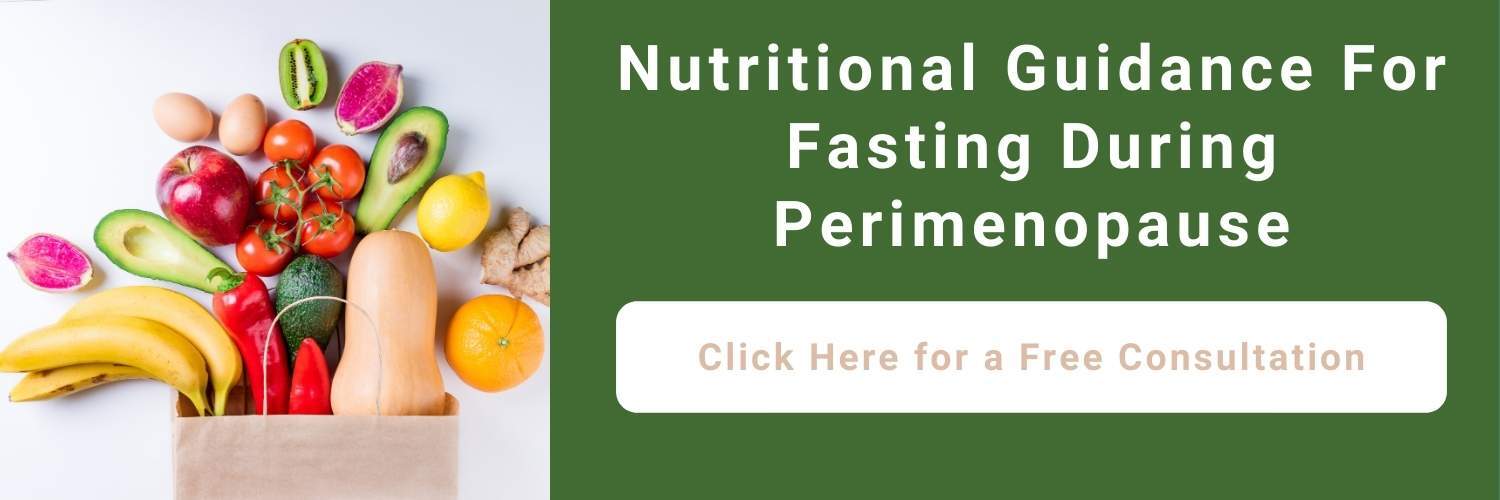A Complete Guide To Perimenopause And Fasting
"The content below is not intended to be a substitute for professional medical advice, diagnosis, or treatment. Always seek the advice of your physician or other qualified health provider with any questions you may have regarding a medical condition."
Hot flashes, mood swings, fatigue, and decreased sex drive. Menopause is on the horizon, and the symptoms are becoming more than tiresome.
How can you find relief naturally?
These things can be addressed by making some lifestyle changes. Is fasting what you’ve been looking for? Maybe you aren’t sure what you need?
This guide will break down what happens to your body during perimenopause and how fasting and nutrition guidance can help.
Table of Contents
What is Perimenopause?
Perimenopause is the transition to menopause, which can last for several years. The body gradually makes less estrogen as you age.
This typically starts around the age of 40. But it can begin even earlier, or later, than that. As the body loses the ability to create estrogen, perimenopause symptoms increase as the body looks for an estrogen replacement.
Perimenopause Symptoms
Two primary hormones control the menstrual cycle: estrogen and progesterone. As the hormones fluctuate, the body reacts in what can be uncomfortable ways.
Here are some common signs of perimenopause:
- Fatigue
- Irregular periods
- Mood swings
- Trouble sleeping
- Hot flashes
- Lower sex drive
- Breast tenderness
- Worsened premenstrual syndrome
- Urine leakage when coughing or sneezing
- Vaginal dryness
This decrease in estrogen and progesterone causes all sorts of problems. Let's talk about a few of them.
Vaginal tissue to become thinner and dryer. Not exactly a turn-on. Periods can become longer or shorter, or they may disappear altogether. As the body decreases in progesterone, periods may become much heavier.
Fibroids may also become worse. These are growths in the walls of your uterus.
Hot flashes, which most women dread, can vary in intensity. They may last 5 to 10 minutes. Some common triggers of hot flashes are:
- Warm temperatures
- Spicy foods
- Hot drinks
- Smoking
- Caffeine
- Stress
Knowing your triggers can help you better manage your symptoms and find some relief.
What can be done to help ease these symptoms? Keep reading to learn how to find some relief.
Why You Gain Weight During Perimenopause
“You're lucky you're young and have a good metabolism” is what we're told when we were young. It's something that might not hit home until the proof lands somewhere around your midsection in the form of a spare tire.
You may be doing all the right things.
Even so, when your metabolism slows, it's harder to lose weight. During perimenopause, maintaining a healthy weight takes more mindfulness than your younger self might needed to do.
There are three types of estrogen in the body:
- Estradiol: found most often in women of childbearing age.
- Estriol: the primary estrogen during pregnancy.
- Estrone: the only estrogen your body makes after menopause.
Estrone , found in fat, is responsible for female sexual development and function. Much is unknown about the full role of estrone, but the body knows it needs it. So it compensates when hormones fluctuate.
When the body realizes that estrogen levels are decreasing, it will increase fat deposits. The body is good at finding a replacement for estrogen by depositing fat.
Perimenopause and Fasting: 4 Ways Fasting Can Help With Your Perimenopause Symptoms
There are many different ways to fast. And not all fasts are created equal.
There is no best way to fast. Everybody has different needs, and it's important to talk to a professional about the best ways to manage your perimenopause symptoms.
One goal of fasting is to allow the body to enter ketosis.
What is ketosis, and why does it matter?
Ketosis a normal response to the low levels of glucose that can occur during low carbohydrate diets or fasting.
Ketosis has many benefits for the body. Ketosis is an established treatment for epilepsy and type 2 diabetes. These Ketone bodies, an energy source for the brain, help reduce inflammation in the brain.#1: Fasting Helps With Weight Loss
Some fast are religious or cultural. These fasts can last from 24 to 48 hours and are an act of devotion, not necessarily weight loss.
High-risk populations such as...
- children,
- pregnant women, and
- those with chronic diseases
...should take great caution before attempting any type of fasting.
How can fasting help you lose weight?
At this point, you've probably heard about intermittent fasting.
Intermittent fasting (IF), or “time-restricted eating,” is a pattern of eating where you eat during limited hours a day. The idea is that fasting mildly stresses the body’s cells, strengthening them and making them more able to resist damage.
IF is not for everybody.
Dr. Sergi at HealthierU can help answer your questions about
and develop an individual plan designed for you. Through Nutrition Response Testing and other natural methods, Dr. Sergi has helped thousands of patients ranging from:
- Digestive Health
- Hot flashes
- Anxiety
- Lower back pain
- And more
Her goal is to help her patients get well with nutrition and lifestyle guidance without the need for surgery or over-the-counter or prescription medication.
#2: Fasting Increases Insulin Sensitivity
Insulin , the hormone released by your pancreas, regulates the number of nutrients circulating in your blood system.
The protein tropomyosin (TPM) is essential for maintaining cellular health. TPM, particularly TPM3, improves the body's sensitivity to insulin. One study found that fasting increased the levels of these beneficial proteins.
Which is good news for those with diabetes.
Though the research to support this is mixed, some research does conclude that dietary changes with exercise can increase insulin sensitivity. Looking at the body holistically can lead to great results.#3: Fasting Helps With Mental Health
What we eat can affect how we feel. And not just in our stomachs. Fasting can improve self-esteem , which can help maintain a more positive mental status.
When you fast, your body is put into a positive stress state.
It is similar to exercise. This causes the body to adapt to help promote health and fight diseases.
During a fast your body does this by:
- Reducing inflammation
- Improving detoxification
- Enhancing cellular renewal
When your body is healthier, your mind tends to follow.
#4: Fasting Helps Decrease Brain Fog
When you fast, your body undergoes autophagy. In Greek, this translates to auto (self) and phagein (to eat), which can be read as to eat oneself.
This is a cellular cleaning process that is activated during fasting.
To begin any renovation, you first have to do some destruction. Your brain is giving the signal to start cleaning out junk it doesn’t need while also stimulating cell growth.How to Fast During Perimenopause
There are many different ways to fast:
- 16:8. This fasting calls for eating for 8 hours a day and fasting for 16 hours. For example, you can stop eating after dinner at 6 p.m., then eat breakfast at 10 a.m. the next day. This method tends to be manageable for most people.
- 20:4. Another time-restricted method is a 20 hour fast with a four-hour eating window. For example, you can eat two meals between 3 p.m. and 7 p.m., then fast for the rest.
- 5:2 or Fast Diet. This method encourages fasting for 2 days of the week. During those two days, calories are restricted to 500 for men and 600 calories for women. During the other five days, eating is not restricted.
- 24-hour fast. This fast means you wait 24 hours between each meal. You will eat one meal a day. This type of fasting is typically done once or twice a week.
- Spontaneous fasting or skipping meals. If intermittent fasting is too overwhelming, you can allow yourself to skip a meal if you don't feel hungry. This is a good introduction to fasting if you want to try it out.
It's recommended that you speak to a professional before beginning any type of fast. Your metabolism, lifestyle, and goals might mean what works for someone else may not work well for you.
When it comes to fasting, what you eat is just as important as when you eat. Eating well can help ease depression and anxiety. Keep reading to learn how you can fast during perimenopause.5 Tips for Perimenopause and Fasting
Here are some basic tips to get you started. Fasting can help ease perimenopause symptoms if done in a way that is most beneficial to your body.
#1: Start Slow
Just like beginning any new habit, it’s good to start slow. Starting with a shorter fast window can help you avoid burnout.
Skipping a meal when you don't feel hungry might be a good start. You could also try the 16:8 method for a week to see how your body responds.
#2: Stay Hydrated
It’s essential to stay hydrated. Drinking water can also help you feel more full during fasting periods.
For the average woman, the recommended daily water intake is 11.5 cups. This can vary depending on your lifestyle or environment. For example, living in a hot or humid area or if you exercise frequently requires an increased water intake.
Water in your diet doesn’t solely come from what you drink. Water-rich foods such as watermelon, strawberries, or spinach are a great way to get more water into your system.
#3: Don’t Over-Reduce Your Caloric Intake
Don’t overdo it.
Your body needs the energy from food to sustain itself. Reducing your caloric intake too much can actually lead to weight gain. Your body will overcompensate and store that food in the form of fat.
Reducing your food intake too much can leave you without the energy your brain needs to function well and can also lead to weaker bones.
#4: Listen To Your Body
Your body knows what it needs and sends you signals. Paying attention to those signals can help you get what you need to thrive.
It’s good to pay attention to how you are feeling and put your health first. If you start feeling sick, re-evaluate your caloric intake and nutrition to ensure you are getting the nutrients you need.
#5: Seek Guidance From A Holistic Nutritionist
At HealthierU in Brooklyn, NY, Dr. Donna Sergi, Nutrition Response Practitioner and Holistic Chiropractor, uses a technique called Nutrition Response Testing . The premise behind Nutrition Response Testing is that your body has the full potential to repair most damage.
Through Nutrition Response Testing, Dr. Sergi can analyze the underlying causes of your unique problems and develop a personalized plan to help manage your perimenopause symptoms and find relief.
Learn more about how a holistic approach to health can help you by scheduling a free consultation today.






